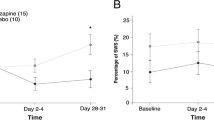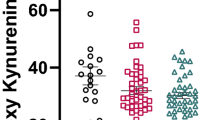Abstract
Sleep disturbances are prevalent in women with HIV (WWH). Tryptophan-kynurenine (T-K) pathway metabolites are associated with alterations in actigraphy derived sleep measures in WWH, although may not always correlate with functional impairment. We investigated the relationship between T-K pathway metabolites and self-reported daytime dysfunction in WWH and women without HIV (WWoH). 141 WWH on stable antiretroviral therapy and 140 demographically similar WWoH enrolled in the IDOze Study had targeted plasma T-K metabolites measured using liquid chromatography-tandem mass spectrometry. We utilized the daytime dysfunction component of the Pittsburgh Sleep Quality Index (PSQI) to assess functional impairment across HIV-serostatus. Lower levels of 5-hydroxytryptophan and serotonin were associated with greater daytime dysfunction in all women. In WWH, daytime dysfunction was associated with increased kynurenic acid (R = 0.26, p < 0.05), and kynurenic acid-tryptophan (KA-T) ratio (R = 0.28, p < 0.01). WWH with daytime dysfunction had a 0.7 log fold increase in kynurenic acid compared to WWH without daytime dysfunction. Kynurenic acid levels and the KA-T ratio were associated with daytime dysfunction in WWH but not in WWoH. Longitudinal studies are needed to establish a causal relationship and directionality between T-K metabolic changes and sleep impairment in WWH.


Similar content being viewed by others
Data availability
No datasets were generated or analysed during the current study.
References
Adimora AA, Ramirez C, Benning L et al (2018) Cohort Profile: the women’s interagency HIV Study (WIHS). Int J Epidemiol 47:393–394i. https://doi.org/10.1093/ije/dyy021
Åkerstedt T, Schwarz J, Gruber G et al (2016) The relation between polysomnography and subjective sleep and its dependence on age - poor sleep may become good sleep. J Sleep Res 25:565–570. https://doi.org/10.1111/jsr.12407
Allavena C, Guimard T, Billaud E et al (2016) Prevalence and risk factors of Sleep Disturbance in a large HIV-Infected Adult Population. AIDS Behav 20:339–344. https://doi.org/10.1007/s10461-015-1160-5
Bacon MC, von Wyl V, Alden C et al (2005) The women’s interagency HIV Study: an observational cohort brings clinical sciences to the bench. Clin Diagn Lab Immunol 12:1013–1019. https://doi.org/10.1128/CDLI.12.9.1013-1019.2005
Benz F, Riemann D, Domschke K et al (2023) How many hours do you sleep? A comparison of subjective and objective sleep duration measures in a sample of insomnia patients and good sleepers. J Sleep Res 32:e13802. https://doi.org/10.1111/jsr.13802
Buysse DJ, Reynolds CF, Monk TH et al (1989) The Pittsburgh Sleep Quality Index: a new instrument for psychiatric practice and research. Psychiatry Res 28:193–213. https://doi.org/10.1016/0165-1781(89)90047-4
Campbell BM, Charych E, Lee AW, Möller T (2014) Kynurenines in CNS disease: regulation by inflammatory cytokines. Front Neurosci 8:12. https://doi.org/10.3389/fnins.2014.00012
Chen Y, Guillemin GJ (2009) Kynurenine pathway metabolites in humans: disease and healthy States. Int J Tryptophan Res 2:1–19. https://doi.org/10.4137/ijtr.s2097
Daubert E, French AL, Burgess HJ et al (2022) Association of Poor Sleep with depressive and anxiety symptoms by HIV Disease Status: women’s interagency HIV Study. J Acquir Immune Defic Syndr 89:222–230. https://doi.org/10.1097/QAI.0000000000002847
Davies NWS, Guillemin G, Brew BJ (2010) Tryptophan, Neurodegeneration and HIV-Associated Neurocognitive Disorder. Int J Tryptophan Res 3. https://doi.org/10.4137/IJTR.S4321. IJTR.S4321
Fuchs D, Möller AA, Reibnegger G et al (1991) Increased endogenous interferon-gamma and neopterin correlate with increased degradation of tryptophan in human immunodeficiency virus type 1 infection. Immunol Lett 28:207–211. https://doi.org/10.1016/0165-2478(91)90005-u
Goelema MS, Regis M, Haakma R et al (2019) Determinants of perceived sleep quality in normal sleepers. Behav Sleep Med 17:388–397. https://doi.org/10.1080/15402002.2017.1376205
Hestad K, Alexander J, Rootwelt H, Aaseth JO (2022) The role of Tryptophan Dysmetabolism and Quinolinic Acid in Depressive and neurodegenerative diseases. Biomolecules 12:998. https://doi.org/10.3390/biom12070998
Huengsberg M, Winer JB, Gompels M et al (1998) Serum kynurenine-to-tryptophan ratio increases with progressive disease in HIV-infected patients. Clin Chem 44:858–862. https://doi.org/10.1093/clinchem/44.4.858
Imahashi M, Ode H, Kobayashi A et al (2021) Impact of long-term antiretroviral therapy on gut and oral microbiotas in HIV-1-infected patients. Sci Rep 11:960. https://doi.org/10.1038/s41598-020-80247-8
Jean-Louis G, Weber KM, Aouizerat BE et al (2012) Insomnia symptoms and HIV infection among participants in the women’s interagency HIV Study. Sleep 35:131–137. https://doi.org/10.5665/sleep.1602
Kandanearatchi A, Brew BJ (2012) The kynurenine pathway and quinolinic acid: pivotal roles in HIV associated neurocognitive disorders. FEBS J 279:1366–1374. https://doi.org/10.1111/j.1742-4658.2012.08500.x
Kaplan KA, Hirshman J, Hernandez B et al (2017) When a gold standard isn’t so golden: lack of prediction of subjective sleep quality from sleep polysomnography. Biol Psychol 123:37–46. https://doi.org/10.1016/j.biopsycho.2016.11.010
Kokturk O, Kanbay A (2015) Tryptophan Metabolism and Sleep. In: Engin A, Engin AB (eds) Tryptophan Metabolism: implications for biological processes, Health and Disease. Springer International Publishing, Cham, pp 239–252
Leone MJ, Sun H, Boutros CL et al (2021) HIV increases sleep-based brain age despite antiretroviral therapy. Sleep 44:zsab058. https://doi.org/10.1093/sleep/zsab058
Lukehart SA, Hook EW, Baker-Zander SA et al (1988) Invasion of the central nervous system by Treponema pallidum: implications for diagnosis and treatment. Ann Intern Med 109:855–862. https://doi.org/10.7326/0003-4819-109-11-855
Ning CX, Chen XX, Lin HJ et al (2019) [Characteristics of sleep disorder in HIV positive and HIV negative individuals: a cluster analysis]. Zhonghua Liu Xing Bing Xue Za Zhi 40:499–504. https://doi.org/10.3760/cma.j.issn.0254-6450.2019.05.002
O’Connor JC, André C, Wang Y et al (2009) Interferon-gamma and tumor necrosis factor-alpha mediate the upregulation of indoleamine 2,3-dioxygenase and the induction of depressive-like behavior in mice in response to bacillus Calmette-Guerin. J Neurosci 29:4200–4209. https://doi.org/10.1523/JNEUROSCI.5032-08.2009
O’Mahony SM, Clarke G, Borre YE et al (2015) Serotonin, tryptophan metabolism and the brain-gut-microbiome axis. Behav Brain Res 277:32–48. https://doi.org/10.1016/j.bbr.2014.07.027
Portas CM, Bjorvatn B, Ursin R (2000) Serotonin and the sleep/wake cycle: special emphasis on microdialysis studies. Prog Neurobiol 60:13–35. https://doi.org/10.1016/s0301-0082(98)00097-5
Pujasari H, Chung M-H (2022) Sleep disturbance in the context of HIV: a Concept Analysis. SAGE Open Nurs 8:23779608221094541. https://doi.org/10.1177/23779608221094541
Qi Q, Hua S, Clish CB et al (2018) Plasma tryptophan-kynurenine metabolites are altered in human immunodeficiency virus infection and Associated with Progression of Carotid Artery atherosclerosis. Clin Infect Dis 67:235–242. https://doi.org/10.1093/cid/ciy053
Reid S, Dwyer J (2005) Insomnia in HIV infection: a systematic review of prevalence, correlates, and management. Psychosom Med 67:260. https://doi.org/10.1097/01.psy.0000151771.46127.df
Rogando AC, Weber KM, Xing J et al (2022) The IDOze Study: the Link between Sleep disruption and tryptophan-kynurenine pathway activation in Women with Human Immunodeficiency Virus. J Infect Dis jiac 287. https://doi.org/10.1093/infdis/jiac287
Rogers BG, Lee JS, Bainter SA et al (2020) A multilevel examination of sleep, depression, and quality of life in people living with HIV/AIDS. J Health Psychol 25:1556–1566. https://doi.org/10.1177/1359105318765632
Rogers BG, Bainter SA, Smith-Alvarez R et al (2021) Insomnia, Health, and Health-Related Quality of Life in an Urban Clinic Sample of People Living with HIV/AIDS. Behav Sleep Med 19:516–532. https://doi.org/10.1080/15402002.2020.1803871
Routy J-P, Mehraj V, Vyboh K (2015) Role of Kynurenine Pathway in HIV/AIDS. In: Mittal S (ed) Targeting the broadly pathogenic kynurenine pathway. Springer International Publishing, Cham, pp 121–131
Saberi P, Neilands TB, Johnson MO (2011) Quality of Sleep: associations with antiretroviral nonadherence. AIDS Patient Care STDS 25:517–524. https://doi.org/10.1089/apc.2010.0375
Samikkannu T, Saiyed ZM, Rao KVK et al (2009) Differential regulation of indoleamine-2,3-dioxygenase (IDO) by HIV type 1 clade B and C Tat protein. AIDS Res Hum Retroviruses 25:329–335. https://doi.org/10.1089/aid.2008.0225
Schwarcz R, Bruno JP, Muchowski PJ, Wu H-Q (2012) Kynurenines in the mammalian brain: when physiology meets pathology. Nat Rev Neurosci 13:465–477. https://doi.org/10.1038/nrn3257
Spitsin S, Pappa V, Kinder A et al (2021) Effect of aprepitant on kynurenine to tryptophan ratio in cART treated and cART naïve adults living with HIV. Med (Baltim) 100:e25313. https://doi.org/10.1097/MD.0000000000025313
Werner ER, Fuchs D, Hausen A et al (1988) Tryptophan degradation in patients infected by human immunodeficiency virus. Biol Chem Hoppe Seyler 369:337–340. https://doi.org/10.1515/bchm3.1988.369.1.337
Wu J, Wu H, Lu C et al (2015) Self-reported sleep disturbances in HIV-infected people: a meta-analysis of prevalence and moderators. Sleep Med 16:901–907. https://doi.org/10.1016/j.sleep.2015.03.027
Xiao Q, Derkach A, Moore SC et al (2017) Habitual sleep and human plasma metabolomics. Metabolomics 13:63. https://doi.org/10.1007/s11306-017-1205-z
Zangerle R, Widner B, Quirchmair G et al (2002) Effective antiretroviral therapy reduces degradation of Tryptophan in patients with HIV-1 infection. Clin Immunol 104:242–247. https://doi.org/10.1006/clim.2002.5231
Zhang Y, Lin CL, Weber KM et al (2023) Association of Gut Microbiota with Objective Sleep measures in Women with and without human immunodeficiency virus infection: the IDOze Study. J Infect Dis 228:1456–1466. https://doi.org/10.1093/infdis/jiad371
Acknowledgements
The authors thank the study participants and the staff at the MWCCS sites.
Funding
The contents of this publication are solely the responsibility of the authors and do not represent the official views of the National Institutes of Health (NIH). The work in this manuscript was primarily funded by the National Heart, Lung, and Blood Institute (R01HL142116; MPIs: Audrey French, Helen Burgess) with additional co-funding for retrospective data collection from the following Women’s Interagency HIV Study (WIHS) clinical research sites (now the MACS/WIHS Combined Cohort Study (MWCCS): Chicago Cook County (U01-HL146245, MPIs: Mardge Cohen, Audrey French); Bronx (U01-HL146204, MPIs: Kathryn Anastos, Anjali Sharma), and Brooklyn (U01-HL146202 MPIs: Deborah Gustafson, Tracey Wilson). The MWCCS is funded primarily by the National Heart, Lung, and Blood Institute (NHLBI), with additional co-funding from the Eunice Kennedy Shriver National Institute Of Child Health & Human Development (NICHD), National Institute On Aging (NIA), National Institute Of Dental & Craniofacial Research (NIDCR), National Institute Of Allergy And Infectious Diseases (NIAID), National Institute Of Neurological Disorders And Stroke (NINDS), National Institute Of Mental Health (NIMH), National Institute On Drug Abuse (NIDA), National Institute Of Nursing Research (NINR), National Cancer Institute (NCI), National Institute on Alcohol Abuse and Alcoholism (NIAAA), National Institute on Deafness and Other Communication Disorders (NIDCD), National Institute of Diabetes and Digestive and Kidney Diseases (NIDDK), National Institute on Minority Health and Health Disparities (NIMHD), and in coordination and alignment with the research priorities of the National Institutes of Health, Office of AIDS Research (OAR). The authors gratefully acknowledge the contributions of the study participants and dedication of the staff at the MWCCS sites. This work was also in part funded by the JHU Center for the Advancement of HIV Neurotherapeutics (JHU CAHN; P30 MH075673).
Author information
Authors and Affiliations
Contributions
Study conceptualization and design: A.F., K.W., R.D., L.R: Patient enrollment and data collection: A.F., A.S., D.G., R.M., T.Y. Metabolomics on plasma samples: C.C., K.B. Wrote the main text and performed analysis: E.S. Provided expert analysis: A.F., K.W., R.D, L.R., E.S., E.D. Critical editing and review: A.R., D.G., A.S., E.D., Q.Q.
Corresponding author
Ethics declarations
Ethical approval
The study was performed according to the principles outlined by the Helsinki Declaration. All participants provided informed consent in accordance with Department of Health and Human Services guidelines and with approval from each site’s institutional review board: Chicago– Cook County Health IRB #18 − 008; Brooklyn– SUNY Downtown state Health Sciences University IRB and Privacy Board #1280378-8; Bronx– Albert Einstein College of Medicine IRB #2018–9115.
Competing interests
The authors declare no competing interests.
Additional information
Publisher’s Note
Springer Nature remains neutral with regard to jurisdictional claims in published maps and institutional affiliations.
Rights and permissions
Springer Nature or its licensor (e.g. a society or other partner) holds exclusive rights to this article under a publishing agreement with the author(s) or other rightsholder(s); author self-archiving of the accepted manuscript version of this article is solely governed by the terms of such publishing agreement and applicable law.
About this article
Cite this article
Shorer, E.F., Rubin, L.H., French, A.L. et al. Tryptophan-kynurenine metabolic pathway and daytime dysfunction in women with HIV. J. Neurovirol. (2024). https://doi.org/10.1007/s13365-024-01195-x
Received:
Revised:
Accepted:
Published:
DOI: https://doi.org/10.1007/s13365-024-01195-x




